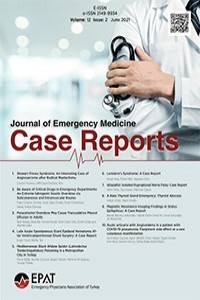Nadir Bir Akut Batın nedeni; Burkitt Lenfoma
Akut Batın, Burkitt Lenfoma
A Rare Cause of Acute Abdomen; Burkitt's Lymphoma
Acute Abdomen, Burkitt’s Lymphoma,
___
- Zinzani PL, Magagnoli M, Pagliani G, Bendandi M, Gherlinzoni F, Merla E, Salvucci M, Tura S. Primary Intestınal Lymphoma: Clınıcal and Therapeutic Features of 32 Patıents. Haematologica 1997; 82: 305-308.
- Jaffe ES, Harris NL, Stein H, Vardiman JW. WHO classification tumours of haematopoietic and lymphoid tissue. Lyon: IARC Press; 2001.
- Knowles DM. Neoplastic Hematopathology. 2nd ed. Philadelphia: Lippincot Williams-Wilkins; 2001.
- Dilworth HP. Neoplasms of the Small Intestine. In:Lacobuzio- Donahue CA, Montgomery EA, Gastrointestinal and Liver Pathology. Goldblum JR, ed. Pennsylvania: Churchıll Livingstone; 2005. p.187-203.
- Gascoyne RD, Muller-Hermeling HK, Chott A, WotherspoonA. Tumours of small intestine. Pathology and genetics oftumours of the digestive system. Lyon: Edited by Hamilton SR, Aaltonen LA: IARC Pres; 2000. p.83-89.
- Isaacson PG. Gastrointestınal Lymphoma. Hum Pathol 1994; 25: 1020. [CrossRef]
- Dawson IM, Cornes J, Morson BC. Primary malignant tumors of the intestinal tract. Report of 37 cases with a study of factors influencing prognosis. Br J Surg 1961; 49: 80-9. [CrossRef]
- Albayrak D, İbis AC, Hatipoğlu AR, Polat N, Hoscoskun Z. Perfore Primer İnce Barsak Lenfoması: Olgu Sunumu. Trakya Univ Tıp Fak Derg 2008; 25: 60-4.
- Crump M, Gospodarowicz M, Shepherd FA. Lymphoma of the gastrointestinal tract. Semin Oncol 1999; 26: 324-37.
- Domizio P, Owen RA, Shepherd NA, Talbot IC, Norton AJ. Primary lymphoma of the small intestine. A clinicopathological study of 119 cases. Am J Surg Pathol 1993, 17: 429. [CrossRef]
- Yayın Aralığı: 4
- Başlangıç: 2010
- Yayıncı: Alpay Azap
İnşaat Çivisine Bağlı Nadir Görülen Baş Boyun Travması: Olgu Sunumu
Bülent AGÜLOĞLU, Aylin GÜL, Musa ÖZBAY, Fazıl Emre ÖZKURT, Müzeyyen ÇETİN, İsmail TOPÇU
Selman YENİOCAK, Asım KALKAN, Süha TÜRKMEN
Non-Hodgkin Lenfomaya Bağlı Gelişen Patolojik Dalak Rüptürü
Alper SÖZÜTEK, Aydın Hakan KÜPELİ, Burhan ŞABAN, Sezgin TOPUZ, Murat ÖZDEMİR, Rana ÇİTİL
Diabetes Mellitusu Olan Bir Kadın Hastada Fournier Gangreni: Bir Olgu Sunumu
Gökhan AKSEL, Betül Akbuğa ÖZEL, Cemil KAVALCI, Murat MURATOĞLU
Epistaksisin Nadir Bir Sebebi Sülük Enfestasyonu: Olgu Sunumu
Yılmaz ZENGİN, Ercan GÜNDÜZ, Mustafa İÇER, Recep DURSUN, Hasan Mansur DURGUN, Ahmet GÜNDÜZALP, Mustafa EKİNCİ
Sağ Atriyal Trombüsü ve Pulmoner Embolisi Olan 81 Yaşındaki Hastada Cerrahi Trombektomi
İhsan ALUR, İ. Doğu KILIÇ, Fahri ADALI, Hayati TAŞTAN, Tevfik GÜNEŞ, İbrahim GÖKŞİN
Nadir Bir Akut Batın nedeni; Burkitt Lenfoma
Bünyami ÖZOĞUL, Abdullah KISAOGLU, Murat SARITEMUR, Atıf BAYRAMOĞLU, Ayhan AKÖZ
Yatakbaşı Ultrason ile Tanı Konulan Künt Boyun Travmasının Geç Prezentasyonu
